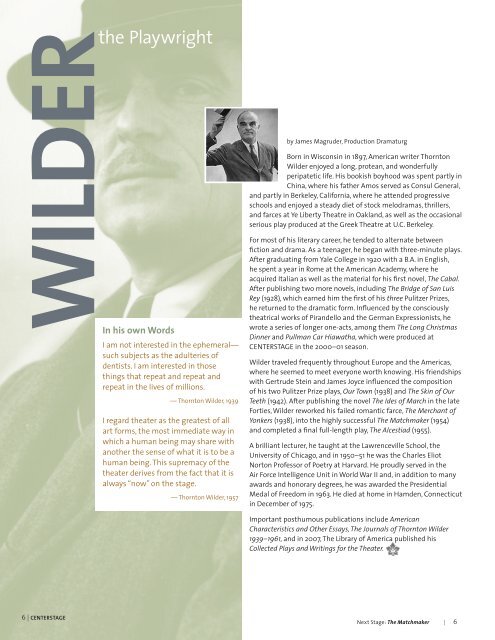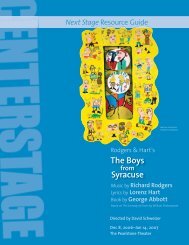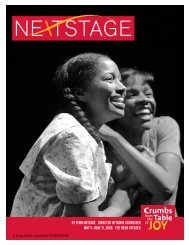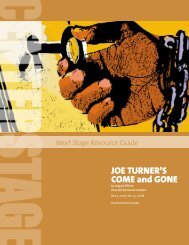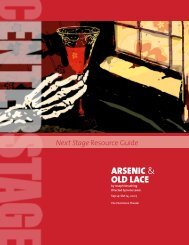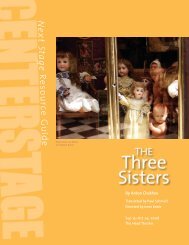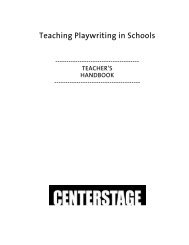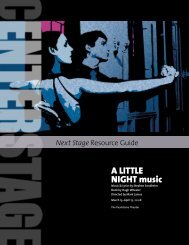The Matchmaker - Center Stage
The Matchmaker - Center Stage
The Matchmaker - Center Stage
Create successful ePaper yourself
Turn your PDF publications into a flip-book with our unique Google optimized e-Paper software.
| CENTERSTAGE<br />
Playwright<br />
WILDeRthe<br />
In his own Words<br />
I am not interested in the ephemeral—<br />
such subjects as the adulteries of<br />
dentists. I am interested in those<br />
things that repeat and repeat and<br />
repeat in the lives of millions.<br />
— Thornton Wilder, 1939<br />
I regard theater as the greatest of all<br />
art forms, the most immediate way in<br />
which a human being may share with<br />
another the sense of what it is to be a<br />
human being. This supremacy of the<br />
theater derives from the fact that it is<br />
always “now” on the stage.<br />
— Thornton Wilder, 1957<br />
by James Magruder, Production Dramaturg<br />
Born in Wisconsin in 1897, American writer Thornton<br />
Wilder enjoyed a long, protean, and wonderfully<br />
peripatetic life. His bookish boyhood was spent partly in<br />
China, where his father Amos served as Consul General,<br />
and partly in Berkeley, California, where he attended progressive<br />
schools and enjoyed a steady diet of stock melodramas, thrillers,<br />
and farces at Ye Liberty <strong>The</strong>atre in Oakland, as well as the occasional<br />
serious play produced at the Greek <strong>The</strong>atre at U.C. Berkeley.<br />
For most of his literary career, he tended to alternate between<br />
fiction and drama. As a teenager, he began with three-minute plays.<br />
After graduating from Yale College in 1920 with a B.A. in English,<br />
he spent a year in Rome at the American Academy, where he<br />
acquired Italian as well as the material for his first novel, <strong>The</strong> Cabal.<br />
After publishing two more novels, including <strong>The</strong> Bridge of San Luis<br />
Rey (1928), which earned him the first of his three Pulitzer Prizes,<br />
he returned to the dramatic form. Influenced by the consciously<br />
theatrical works of Pirandello and the German Expressionists, he<br />
wrote a series of longer one-acts, among them <strong>The</strong> Long Christmas<br />
Dinner and Pullman Car Hiawatha, which were produced at<br />
CENTERSTAGE in the 2000–01 season.<br />
Wilder traveled frequently throughout Europe and the Americas,<br />
where he seemed to meet everyone worth knowing. His friendships<br />
with Gertrude Stein and James Joyce influenced the composition<br />
of his two Pulitzer Prize plays, Our Town (1938) and <strong>The</strong> Skin of Our<br />
Teeth (1942). After publishing the novel <strong>The</strong> Ides of March in the late<br />
Forties, Wilder reworked his failed romantic farce, <strong>The</strong> Merchant of<br />
Yonkers (1938), into the highly successful <strong>The</strong> <strong>Matchmaker</strong> (1954)<br />
and completed a final full-length play, <strong>The</strong> Alcestiad (1955).<br />
A brilliant lecturer, he taught at the Lawrenceville School, the<br />
University of Chicago, and in 1950–51 he was the Charles Eliot<br />
Norton Professor of Poetry at Harvard. He proudly served in the<br />
Air Force Intelligence Unit in World War II and, in addition to many<br />
awards and honorary degrees, he was awarded the Presidential<br />
Medal of Freedom in 1963. He died at home in Hamden, Connecticut<br />
in December of 1975.<br />
Important posthumous publications include American<br />
Characteristics and Other Essays, <strong>The</strong> Journals of Thornton Wilder<br />
1939–1961, and in 2007, <strong>The</strong> Library of America published his<br />
Collected Plays and Writings for the <strong>The</strong>ater.<br />
Next <strong>Stage</strong>: <strong>The</strong> <strong>Matchmaker</strong> |


